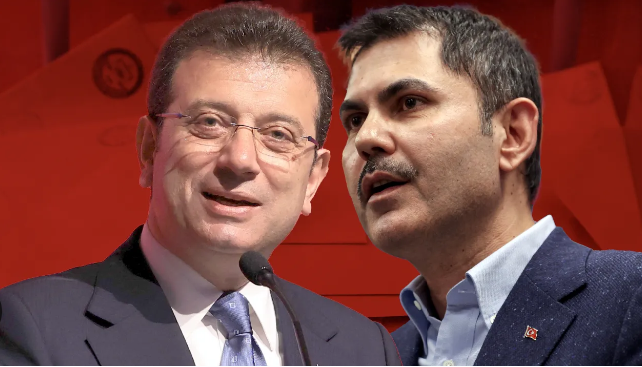It was clear that the main race in the election would be for the mayorship of Istanbul Metropolitan Municipality as early as when President Tayyip Erdoğan launched his campaign with the goal of “Istanbul Again”. Now, 10 days before the election, this race is being fought out. On April 1, it is not clear whether the winner will be Ekrem İmamoğlu, the CHP mayor of IBB, or Murat Kurum, the AK Party candidate. The polls showing İmamoğlu and Kurum first are still within the margin of error of the polls.
Two scenarios on April 1
If Imamoğlu wins the Istanbul election, we will wake up to a different Turkey on April 1, and if Kurum wins, we will wake up to a different Turkey; but in both cases, that Turkey will not be the Turkey of today.
On April 1, depending on whether Imamoğlu or Kurum will take the IBB seat, there are two scenarios, both of which will be different from today.
Both in terms of politics and economy. Politics first.
If Kurum wins
If Kurum wins, it will not only mean that Erdoğan has achieved his goal of retaking Istanbul, which he lost to the CHP after 25 years in 2019, but also that he has integrated Istanbul with the central administration’s resources, with its country-sized budget and resources.
It will also mean a consolidation and integration of political power on a large scale. Namely, as Erdoğan’s ally MHP leader Devlet Bahçeli emphasized, April 1 will open the door for the Presidential Government System to penetrate the capillaries of the country, including local governments.
It is hard to say that this perspective was clear in Erdoğan’s and Bahçeli’s political plans before the 2019 local elections. Its importance was realized in 2019 when the CHP lost Istanbul, as well as metropolitan cities such as Ankara, Antalya, Adana and Mersin, to the CHP, leaving a vacuum or depriving them of the opportunities of those municipalities.
A win for the Kurum in Istanbul would also open the door for Erdoğan to further close the executive power to checks and balances through constitutional amendments and to run again and again with the support of Bahçeli.
The opposition and the media will also wake up to a new era.
If Imamoglu wins
If Imamoğlu wins, it will be perceived as Erdoğan’s loss, not that of the Institution. This is not the fault of the Institution; Erdoğan wanted it to be perceived this way. But it will not only mean that Erdoğan has lost once again to the same person after 5 years and after being elected President once more. On April 1, Imamoğlu’s retention of the IBB seat is partly a desire of the Turkish electorate to preserve the counter-balance in governance and the pluralistic structure of society, and partly a decision to stand against a scenario in which local governments are completely under the control of the executive power.
And if Imamoglu retains his seat on April 1, he will be a political leader in Turkish politics who has beaten Erdogan by two times34. The fact that the ruling parties as well as the opposition parties and even some factions within the CHP are working against İmamoğlu shows this. Because if İmamoğlu wins, he will be perceived as the natural leader not only of the CHP but also of the anti-Erdoğan opposition, and he will be a leader with this warrior characteristic: Imamoğlu is the person that Erdogan looks at and sees his own rise: not only to the establishment, but also within his own party, and he started to climb by proving himself in Istanbul.
And on April 1st the economy
Imamoğlu’s victory means the re-establishment of domestic political balances in Turkey.
This includes the Constitutional amendment. On April 1, if Imamoğlu retains his seat, this will not make it easier for the Erdoğan-Bahçeli alliance’s to decide on holding a referendum on constitutional amendments.
In fact, a major obstacle to a referendum on constitutional amendments is the economic crisis. Şimşek who is conytrol of Turkey’s economy, and indeed Erdoğan himself, say the election economy, is delaying recovery from the economic crisis.
The Medium Term Program for the exit from the economic crisis, with all its austerity and economic cooling measures, will make a new start on April 1. Indeed, the fact that Turkey will wake up to a new economic environment on April 1 is a fact independent of whether İmamoğlu or Kurum wins. But in addition to the already challenging economic conditions, it will be riskier to put the ballot box in front of the people again, especially if the opposition holds big cities like Istanbul, Ankara and Izmir.
The economic crisis will be a factor that will determine the two different scenarios that will come before us on April 1, with İmamoğlu or Kurum winning.
